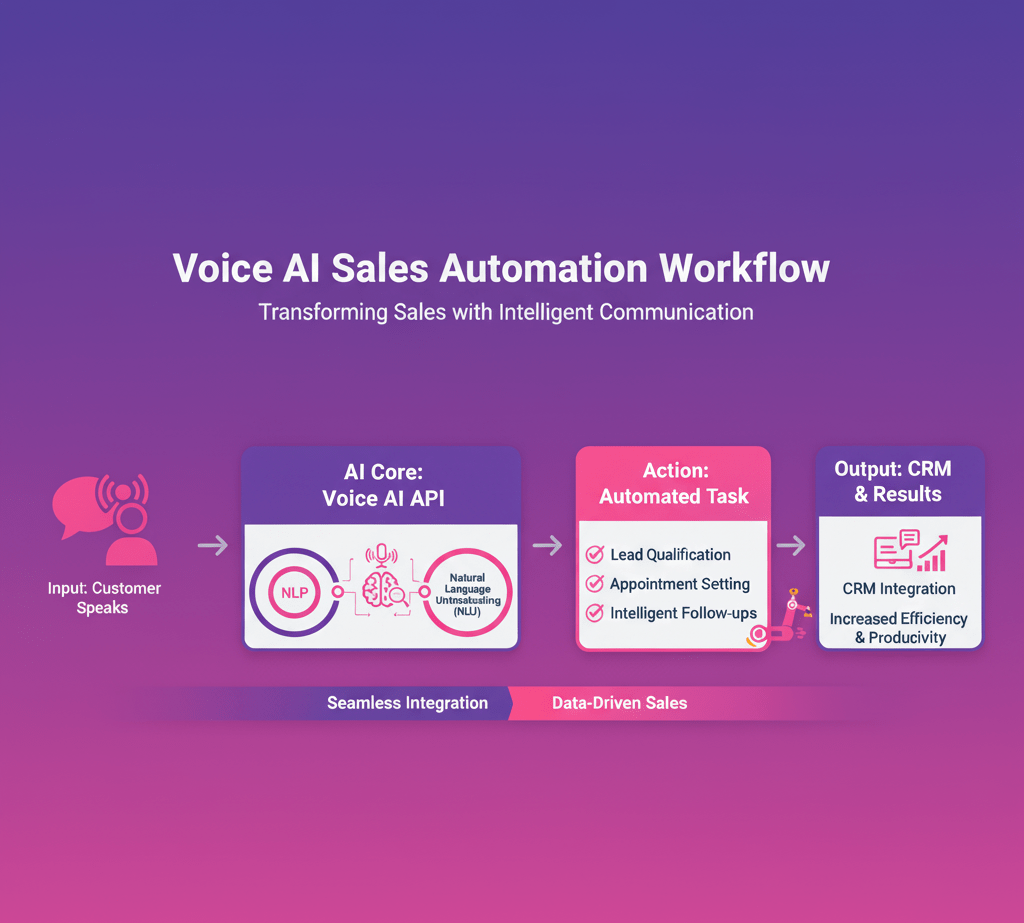“Build highly efficient, custom sales workflows, from automated calling to intelligent follow-ups, by leveraging the powerful and programmable Voice AI API for Sales Automation.”
Sales. It’s the lifeblood of any business. But let’s be honest, it can be a grind. Repetitive tasks, endless follow-ups, and the constant need to be “on” can exhaust even the most dedicated sales professional. What if you could take the mundane out of sales? What if you could empower your team to focus on what they do best – building relationships and closing deals – while AI handled the rest? This isn’t science fiction. It’s the power of a voice AI API for sales automation.
Imagine a world where your sales operations are smarter, faster, and more efficient. That’s the promise of integrating programmable voice into your sales stack. This article will show you how to leverage a conversational AI API to build custom sales workflows. We’ll explore everything from streamlining calls to automating scheduling, follow-ups, and customer engagement. Get ready to gain real, actionable insights into how to truly enhance your sales processes with AI truly.
What Exactly is a Voice AI API?
Before we dive into the “how,” let’s clarify the “what.” A Voice AI API (Application Programming Interface) is a set of tools and protocols that enable communication between applications. They allow different software applications to communicate with each other. In simpler terms, it’s a bridge. This bridge lets your existing platforms tap into advanced voice artificial intelligence capabilities.
Think of it this way: you have a powerful engine (the voice AI). The API is the dashboard and controls. It allows you to instruct the engine on what to do. Specifically, a voice AI API enables your applications to:
- Understand Spoken Language: This is known as Natural Language Processing (NLP). It’s the AI’s ability to comprehend what someone says, not just convert it to text.
- Generate Human-like Speech: This is Text-to-Speech (TTS). It takes written text and converts it into natural-sounding spoken audio.
- Process and Respond in Real-Time: The API facilitates a seamless back-and-forth conversation. It listens, processes, and responds dynamically.
This technology is more than just voice recognition. It’s about building intelligent, interactive voice experiences. It’s about giving your software a voice and an ear.
How Does a Voice AI API Work for Sales?
Let’s break down the mechanics. When you integrate voice AI into your platform, several complex processes happen behind the scenes:
- Speech-to-Text Conversion: A customer speaks. The voice AI API captures this audio. Then it quickly transcribes it into text. This text becomes the input for the AI’s understanding.
- Natural Language Understanding (NLU): This is where the magic happens. The AI doesn’t just see words; it also understands them. It analyzes the text for meaning, intent, and context. Is the customer asking a question? Are they expressing interest? Do they have a problem? NLU figures it out.
- Decision Making & Logic: Based on the NLU, your custom-built sales agent decides the next step. This logic is something you program. It could be answering a question, retrieving information, scheduling an appointment, or transferring the call.
- Text-to-Speech Generation: Once the AI has determined its response, it converts that response back into natural-sounding speech. This happens using its Text-to-Speech capabilities. The speech is delivered back to the customer.
- Continuous Learning: Many advanced voice AI APIs also incorporate machine learning. This means they get smarter over time. They learn from interactions. They refine their understanding and responses.
This entire cycle happens in milliseconds. It creates a fluid, conversational experience. It feels very much like talking to a human. The beauty of an API is that you don’t need to build these complex AI models from scratch. You simply plug into an existing, powerful engine.
Practical Use Cases: Building Your Own Sales Agent
Now for the exciting part. How can you actually use a conversational AI API to transform your sales operations? The possibilities are vast. They range from automating repetitive tasks to creating entirely new engagement channels.
1. Outbound Call Automation
Imagine launching highly personalized outbound campaigns without your team making a single manual dial. This is a game-changer.
- Lead Qualification: Your AI sales agent can make initial calls to new leads. It can ask qualifying questions. It can identify serious prospects. This frees up your human sales reps. They only talk to genuinely interested individuals.
- Appointment Setting: The AI can call prospects to schedule demonstrations or meetings. It can access your team’s calendars in real-time. It can confirm appointments. It can send reminders. This dramatically reduces no-shows.
- Event Registrations: Planning a webinar or sales event? Your AI can call potential attendees. It can provide event details. It can process registrations. It can answer common questions.
- Nurturing Dormant Leads: Re-engaging old leads can be a time-consuming process. An AI agent can periodically call these leads. It can check for renewed interest. It can update them on new offerings.
This approach allows for scalable outreach. You can reach more prospects, faster, and with consistent messaging.
2. Inbound Call Management
Voice AI isn’t just for outbound efforts. It can revolutionize how you handle incoming calls.
- First-Level Support & Information: An AI agent can handle common inbound inquiries. It can provide product information. It can answer FAQs. It can route complex calls to the correct human department. This reduces call wait times. It improves customer satisfaction.
- Pre-Sales Question Answering: Prospects often call with basic questions before speaking to a rep. Your AI can field these. It can qualify the caller’s needs. It can gather necessary information. Then it can seamlessly hand off to a human rep with a complete context.
- Order Status and Tracking: For businesses with physical products, customers frequently call to inquire about order updates. The AI can integrate with your logistics system. It can provide real-time tracking information.
- Basic Troubleshooting: If your product or service has typical issues, the AI can guide customers through initial troubleshooting steps. This can resolve problems quickly. It can reduce the load on your support team.
By automating calls with an API, you ensure every inbound call is handled efficiently. You provide instant responses, even during peak hours.
3. Automated Scheduling and Reminders
Scheduling is a huge time sink for sales teams. Coordination, back-and-forth emails, and reminder calls add up.
- Meeting Booking: Your voice AI can interact directly with prospects. It can find a suitable time slot in your sales reps’ calendars. It can send calendar invitations. It can handle rescheduling requests.
- Follow-Up Reminders: The AI can automatically call or text prospects before a scheduled meeting. This helps reduce no-shows. It confirms their availability.
- Trial Expiration Reminders: If you offer product trials, the AI can proactively remind users when their trial is about to expire. It can offer to extend the trial or guide them to purchase options.
- Service Appointment Scheduling: For businesses that offer services, the AI can help customers book maintenance, consultation, or installation appointments.
This level of automation ensures your sales team spends less time on administrative tasks and more time actually selling.
4. Intelligent Follow-Ups
The fortune is in the follow-up. But consistent, personalized follow-ups are hard to maintain manually.
- Post-Interaction Follow-Ups: After a demo or an initial call, your AI can follow up. It can send an email summary. It can provide additional resources. It can even schedule a quick “check-in” call.
- Abandoned Cart Recovery: For e-commerce businesses, an AI can proactively reach out to customers who left items in their cart. It can offer assistance. It can answer questions. It can provide incentives to complete the purchase.
- Re-Engagement Campaigns: For customers who haven’t interacted recently, the AI can initiate a personalized re-engagement campaign. It can highlight new features. It can offer special promotions.
- Feedback Collection: After a sale or a support interaction, the AI can call customers. It can collect feedback. It can conduct quick surveys. This provides valuable insights and shows you care.
By automating these personalized follow-ups, you maintain consistent communication. You increase conversion rates. You build stronger customer relationships.
5. Personalized Product Demonstrations
This is a more advanced application. But it showcases the true potential of custom AI sales workflows.
- Interactive Product Tours: Imagine an AI guiding a prospect through a product’s features over the phone. It can answer questions in real-time. It can tailor the explanation to the prospect’s specific needs.
- Feature Walkthroughs: For existing customers, the AI can offer quick walkthroughs of new features or updates. This ensures they get the most out of your product.
- Q&A Sessions: During a demonstration, the AI can field common questions. It can provide immediate answers. This allows your human reps to focus on more complex, deal-specific discussions.
This allows for highly personalized and on-demand product education. It can significantly shorten the sales cycle.
6. Enhanced Customer Engagement
Beyond direct sales, a natural language processing API can improve overall customer engagement. This indirectly boosts sales.
- Proactive Support: The AI can monitor customer usage patterns to provide proactive support. It can identify potential issues before they become problems. It can proactively reach out to offer assistance.
- Onboarding Assistance: Guide new customers through the onboarding process. Answer their initial questions. Ensure they have a smooth start.
- Loyalty Program Management: Inform customers about their loyalty points. Tell them about upcoming rewards. Answer questions about the program.
- Customer Satisfaction Checks: Periodically check in with customers to ensure their satisfaction. Ask about their satisfaction. Offer help if needed.
Better engagement leads to higher retention. Higher retention leads to more lifetime value. This creates a powerful sales cycle.
Benefits of Integrating Voice AI into Modern Sales Strategies
The advantages of adopting a scalable outreach API and incorporating voice AI are compelling. They impact every facet of your sales organization.
1. Increased Efficiency and Productivity
This is the most immediate benefit.
- Time Savings: Your sales team stops wasting time on repetitive tasks. This includes cold calling unqualified leads, scheduling appointments, and sharing basic information. They get more hours back in their day.
- Focus on High-Value Activities: Reps can dedicate their energy to building relationships. They can work on complex negotiations. They can close deals. These are the activities that truly require human intelligence and empathy.
- Faster Sales Cycle: Automation speeds up every stage. Lead qualification is quicker. Follow-ups are immediate. Information is instantly available. This shortens the time from lead to closed deal.
- Reduced Administrative Burden: Less manual data entry. Less calendar juggling. More time selling.
2. Cost Reduction
Streamlining operations always leads to savings.
- Lower Labor Costs: Automating tasks enables you to handle a higher volume with the same-sized team. Or you can reallocate staff to higher-impact roles.
- Reduced Training Time: With AI handling routine inquiries, new sales representatives can ramp up more quickly. They can focus on learning complex sales strategies.
- Optimized Resource Allocation: Ensure your most experienced reps are focused on the most promising leads. Let the AI handle the rest.
- Fewer Errors: Automated processes are less prone to human error. This means fewer mistakes in scheduling, data entry, and communication.
3. Enhanced Customer Experience
Customers today expect speed and personalization. Voice AI delivers both.
- Instant Responses: No more waiting on hold. No more delayed callbacks. Customers get immediate answers to their questions.
- 24/7 Availability: Your AI sales agent never sleeps. It can handle inquiries and conduct outreach around the clock. This serves customers in different time zones.
- Personalized Interactions: With good programming, the AI can tailor its responses. It can recall past interactions. It can address the customer by name. It can recommend relevant products.
- Consistent Messaging: Every interaction with the AI will be on-brand and consistent. This ensures a professional image every time.
4. Scalability
Growth often brings growing pains. Voice AI helps you scale smoothly.
- Handle Increased Volume: As your business grows, your AI can handle a proportional increase in calls and interactions. You don’t need to rush into hiring and training new staff rapidly.
- Expand Market Reach: Launch campaigns in new regions or languages with greater ease and efficiency. A voice AI can be programmed to speak multiple languages.
- Support Seasonal Peaks: During busy seasons, your AI can manage the surge in activity. It can maintain service levels. It can prevent your team from becoming overwhelmed.
- Agile Campaign Deployment: Quickly launch and adjust sales campaigns with ease. Test different scripts. Analyze performance. Adapt without significant operational overhead.
5. Data-Driven Insights
The interactions your voice AI handles generate a wealth of data.
- Call Analytics: Track call duration, outcomes, and typical customer questions. Identify trends. Improve your sales processes.
- Performance Metrics: Measure the effectiveness of your AI agent. How many leads did it qualify? How many appointments did it set? What’s its conversion rate?
- Customer Sentiment Analysis: Advanced NLP can gauge customer mood. It can detect frustration or interest. This helps you understand your audience better. It allows for proactive interventions.
- Script Optimization: Analyze which AI scripts perform best. Refine your messaging based on real-world results.
This data is invaluable. It helps you continuously improve your sales strategy.
Developing with a Voice AI API: Sales Automation for Developers
If you’re a developer, the thought of building your own sales agent with a voice AI API is exciting. Here’s what you need to consider.
1. Choose the Right API
Many providers offer conversational AI API solutions. Look for:
- Robust NLP and TTS: The core capabilities must be strong. The AI needs to understand accurately. It needs to speak naturally.
- Ease of Integration: Good documentation, SDKs, and libraries simplify the integration process.
- Scalability: Can the API handle your projected call volumes?
- Customization Options: Can you train the AI on your specific industry jargon? Can you create custom voice profiles?
- Pricing Model: Understand the costs per minute, per interaction, or per API call.
- Security and Compliance: Especially important for sensitive customer data.
2. Define Your Workflow
Before writing a single line of code, map out the exact sales process you want to automate.
- What is the Goal? Lead qualification? Appointment setting? Customer support?
- What are the Steps? How will the conversation flow? What questions will be asked? What information needs to be gathered?
- What are the Decision Points? What happens if the customer says “yes”? What if they say “no”? When should a human agent be involved?
- What Data Needs to Be Accessed/Updated? Integrate with your CRM, calendar, or product database.
3. Design the Conversation Flow (Dialogue Management)
This is crucial for a natural-sounding interaction.
- Scripting: Write out potential dialogues. Consider different scenarios.
- Intent Recognition: Program the AI to recognize various user intents (e.g., “I want to book a demo,” “Tell me about pricing”).
- Entity Extraction: Identify key pieces of information (e.g., date, time, product name, customer name).
- Context Management: Ensure the AI remembers previous parts of the conversation. It should respond relevantly.
- Error Handling: What happens if the AI doesn’t understand? Provide graceful fallback options.
4. Integrate with Your Existing Systems
This is where the API truly shines.
- CRM Integration: Update lead status, log call details, and add notes to customer profiles.
- Calendar Integration: Book appointments directly into your sales team’s calendars.
- Database Integration: Access product information, pricing, or customer history to provide accurate responses.
- Email/SMS Integration: Send follow-up emails or texts after a call to reinforce key points and ensure a lasting impact.
5. Iteration and Optimization
Building an effective AI agent is an ongoing process.
- Testing: Rigorously test your agent with different scenarios and voices.
- Monitoring: Analyze call logs and performance metrics to ensure optimal operation. Identify areas for improvement.
- Refinement: Continuously update your scripts. Train your AI on new phrases or intents.
- A/B Testing: Experiment with different conversational flows to determine which one performs best.
Remember, the goal is to create a seamless, helpful, and practical experience. The better your design, the more successful your custom AI sales workflows will be.

Introducing SalesCloser.ai: Your Premier AI Sales Agent Platform
You’ve learned about the immense potential of voice AI APIs. You’ve seen how to automate calls with API and build sophisticated sales workflows. Now, imagine a platform that brings all these capabilities together, pre-built and optimized for sales.
That’s where SalesCloser.ai comes in.
SalesCloser.ai is not just an API; it’s the best AI sales agent platform. It’s designed from the ground up to empower your sales team and revolutionize your customer interactions. SalesCloser.ai directly aligns with every custom sales automation concept we’ve discussed, simplifying implementation and delivering immediate value.
Here’s how SalesCloser.ai helps you close more deals:
- Handles Phone and Video Calls: SalesCloser.ai agents are adept at both traditional phone calls and modern video interactions. They can engage with prospects and customers naturally. They can handle initial inquiries, provide information, and qualify leads seamlessly.
- Automated Scheduling: Say goodbye to endless email chains for meeting bookings. SalesCloser.ai integrates directly with your team’s calendars. It finds optimal times. It sends invitations. It manages reschedules effortlessly.
- Intelligent Follow-ups: SalesCloser.ai ensures no lead falls through the cracks. It automates personalized follow-up calls, emails, and messages. It nurtures prospects through your sales funnel. It keeps your brand top-of-mind.
- Personalized Product Demonstrations: Leverage SalesCloser.ai to provide interactive, on-demand product walkthroughs. Your AI agent can answer specific questions. It can highlight relevant features based on individual prospect needs. It can do this without requiring a human rep’s immediate attention.
- Customer Support Assistance: Free up your support team. SalesCloser.ai can handle common customer queries, troubleshoot fundamental issues, and provide instant answers 24/7. This enhances customer satisfaction and enables your human agents to concentrate on more complex issues.
- Seamless CRM Integration: SalesCloser.ai logs every interaction. It updates lead statuses. It adds valuable notes directly into your existing CRM. This ensures your sales team always has the latest information. It maintains a single source of truth.
- Scalable Outreach: Launch vast outbound campaigns with confidence. SalesCloser.ai can handle massive volumes of calls and interactions. It does this without compromising on personalization or quality. Scale your efforts up or down as needed.
SalesCloser.ai is designed for businesses that require efficiency, personalization, and tangible results. It combines the power of a cutting-edge voice AI API with a comprehensive platform. This makes it easy to deploy sophisticated custom sales automation. Stop leaving money on the table. Start leveraging the most advanced AI sales agent platform.
Ready to see how SalesCloser.ai can transform your sales operations? Visit SalesCloser.ai today and discover the future of selling.
The Future of Sales: Personalized and Programmed
The shift towards programmable voice for sales is not just a trend. It represents a fundamental shift in how businesses interact with their customers. We are moving beyond simple chatbots and into knowledgeable, conversational agents. These agents can handle complex interactions. They can provide personalized experiences. They can operate at a scale that has never been possible before.
Imagine a world where your sales team is an agile, strategic force. They focus entirely on complex deals. They build deep relationships. They innovate new sales tactics. Meanwhile, a fleet of intelligent AI agents handles the heavy lifting. They qualify leads. They set appointments. They follow up meticulously. They even provide initial product demonstrations.
This future isn’t far off. It’s here now. Businesses that embrace text-to-speech for sales and advanced voice AI APIs will gain a significant competitive edge. They will acquire customers faster. They will retain them longer. They will do it all more efficiently than ever before.
FAQs: Your Questions About Voice AI for Sales Automation Answered
Q: Is a voice AI API difficult to integrate?
A: It depends on the API and your existing platform. Many modern voice AI APIs offer clear documentation, SDKs (Software Development Kits), and libraries. These resources make integration simpler for developers. If you have a development team, they can integrate it smoothly.
Q: Can the AI sound natural, or will it sound like a robot?
A: Modern Text-to-Speech (TTS) technology has come a long way. Many voice AI APIs offer highly natural-sounding voices. They can even replicate human intonation and emotion. You can often choose from various voice profiles to match your brand.
Q: What about complex sales scenarios that require empathy?
A: Voice AI excels at automating repetitive and information-gathering tasks. For highly complex negotiations or situations that require deep empathy, a human sales representative is still essential. The goal is to free up your human team to focus on those high-value interactions. The AI handles the groundwork.
Q: How much does a voice AI API cost?
A: Pricing models vary significantly. They can be based on factors like: * Per-minute usage for voice calls. * Per-API call or transaction. * Data processing volume (Speech-to-Text, Text-to-Speech). * Subscription tiers for advanced features. Many providers offer free tiers or trials. This allows you to test the waters before making a commitment.
Q: Can the AI speak multiple languages?
A: Yes, many advanced voice AI APIs support multiple languages. You can often configure your AI agent to interact with customers in their preferred language. This expands your reach significantly.
Q: Is my customer data secure with a voice AI API?
A: Reputable voice AI API providers prioritize data security and compliance. They use encryption and adhere to industry standards. Always review the provider’s security policies to ensure you are protected. Ensure they meet your business’s compliance requirements (e.g., GDPR, HIPAA).
Q: How do I train the AI to understand my specific products or services?
A: You provide the AI with data. This includes example phrases, product names, and relevant information. This process is referred to as “training” or “fine-tuning” the model. Many APIs offer tools to help you do this. The more data you provide, the more accurate and effective your AI becomes.
Q: Will voice AI replace my sales team?
A: No, voice AI is a tool. It augments your sales team. It handles the mundane and repetitive tasks. It frees up your human reps to focus on strategic selling. It helps them build stronger relationships. AI makes your sales team more effective, not obsolete.






